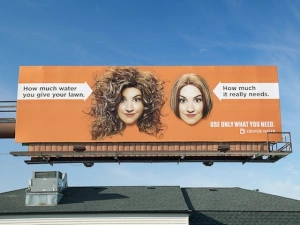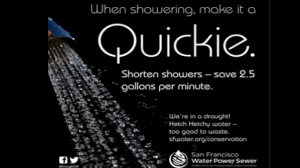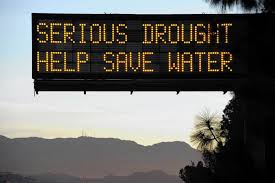A Facebook friend posted a scathing description of her neighbor. The words, “selfish,” and “irresponsible” were used to describe him. His offense, he watered his rose bushes during a drought. Many of the 32 responses urged her to report him to the city. She posted she already had. I didn’t enter a response or hit the “like” button. While I’m glad water conservation sparks attention in the public conversation, these threads of public discourse are superfluous. There is nothing long-lasting about turning your neighbor in for watering his roses or God forbid, hosing down his driveway.
During each drought period, there is a heightened awareness of water. Articles printed in newspapers and magazines report low reservoir levels, dry wells, and fallow fields. From Texas to Tennessee, electric road signs and billboards read variations of “Save Water, Severe Drought.” And we each become unofficially deputized as water cops, deployed to report the neighbor watering his rose bush.

“Use what you need,” urged Denver Water during the 2008 drought.
When the drought is declared over, news stories dry up; billboards replaced, and conversations move to the next crisis. And we remain in the same predicament; half the world population will experience freshwater shortages, referred to as water scarcity by 2030. Water scarcity is expected to result in the deaths of millions and an unprecedented rise in military conflicts. Of all the crises coming to a head– water scarcity is the least understood.

Clever Campaign to encourage shorter showers launched by San Francisco Water Power Service
I sold 80,000 shower timers before realizing I was saving water in the wrong room of the house. If 7 out of every 10 gallons of fresh water is used to grow food, then isn’t it logical to focus on the kitchen and by extension the farms that produce our food? This is why I became interested in water footprint. But as I’ve visited farms and researched for my book in progress, I’ve learned that water footprints tell a partial story. A richer story is told in color…or rather with the colors of water.
I choose food made from green water, that is rain-fed or dry farmed when possible. I buy organic because chemical fertilizers or pesticides are disallowed. Both kill microbes in the soil, diminishing the soils ability to retain water. When soil can’t retain water, it leads to more runoff, thirstier plants and stressed groundwater supplies. I wrote more on the subject in the article, Why American Soil Makes Us Sick.
Instead of reporting my neighbor for watering his rosebushes, I’d ask him over for dinner, and serve him less water at the kitchen table.
Eat less water at the kitchen table. There is power in the collective!
Be well,
Florencia


Wish there was a ‘love’ button. This message really needs to get into the mainstream. I recently looked up the point sources for greenhouse gas pollution in my county and was pretty surprised to see that our solid waste sites are MAJOR contributors. So not only are we drawing water from aquifers to grow this food, which is then trucked over long distances where ultimately too many people just wind up throwing it all away! Not only is there is no chance for the aquifers to recharge but it also gets transformed into greenhouse gas pollution. Unbelieveably stupid and horrifying. Fix the way we grow and prepare food and we will go a very long way toward fixing almost every environmental problem out there. Could it really be that simple? I can’t wait to read your book.
I wish I could hit the “love” button for your comment Debra. YES, this message does need to be mainstream and YES changing the way we grow food will go a long way to fix the health of our water resources, soil and air. The good news is we can change the food system now with our own food choices and it will have a ripple effect.
Thank you for the work you do in the world.